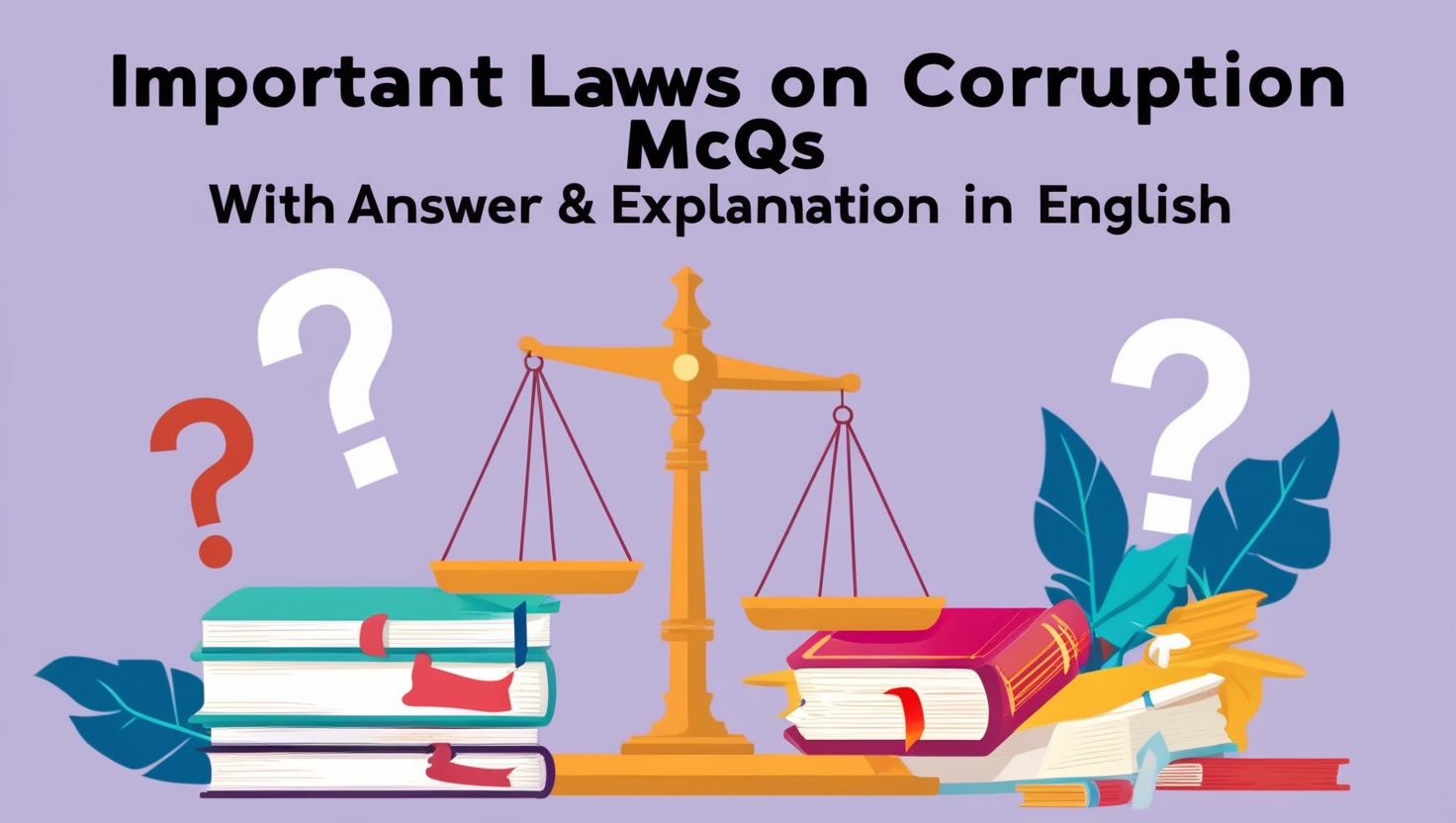
Corruption remains a significant challenge globally, undermining governance and public trust. In this article, we delve into the Important Laws on Corruption MCQs With Answer & Explanation in English, providing an insightful overview of key legislation aimed at combating corruption.
Through multiple-choice questions (MCQs), readers will not only test their knowledge but also gain a deeper understanding of these crucial laws, their implications, and their role in promoting transparency and accountability in society.
1. Which section of IPC pertains to a public servant unlawfully buying or bidding for property?
- Section 169
- Section 170
- Section 171
- Section 172
Show Answer
Answer: Section 169
Section 169 of the Indian Penal Code (IPC) deals with public servants unlawfully purchasing or bidding for property. Under this section, a public servant engaging in such activity is liable to be punished with imprisonment for up to two years, or a fine, or both.
2. In which year was the Benami Transactions (Prohibition) Act passed?
- 1986
- 1987
- 1988
- 1990
Show Answer
Answer: 1988
The Benami Transactions (Prohibition) Act, enacted in 1988, aims to prevent and prohibit benami transactions, where a person buys property in the name of another who does not pay for it, except when purchased in the name of a spouse or unmarried daughter. This Act aims to curb such practices and prevent tax evasion.
3. Which of the following authorities are established through the Benami Transactions (Prohibition) Act?
- Initiating Officer
- Approving Authority
- Administrator
- All of the above
Show Answer
Answer: All of the above
The Benami Transactions (Prohibition) Act establishes several authorities, including the Initiating Officer, Approving Authority, Administrator, and Adjudicating Authority, to handle cases related to benami transactions.
4. How many sections are there in the Benami Transactions (Prohibition) Act, 1988?
- 7
- 8
- 9
- 10
Show Answer
Answer: 9
The Benami Transactions (Prohibition) Act of 1988 consists of 9 sections with only three substantive sections – sections 3, 4, and 5.
5. In which year was the Black Money (Undisclosed Foreign Income and Assets) and Imposition of Tax Act enacted?
- 2014
- 2015
- 2016
- 2017
Show Answer
Answer: 2015
Enacted in 2015, this law aims to combat black money and undisclosed foreign assets and income. It imposes a penalty equal to three times the amount of tax payable in addition to a 30% tax on undisclosed foreign income or assets.
6. What is the penalty for non-disclosure of foreign income or assets under the Black Money (Undisclosed Foreign Income and Assets) and Imposition of Tax Act, 2015?
- Equal to two times the amount of tax payable, in addition to tax payable at 30%.
- Equal to three times the amount of tax payable, in addition to tax payable at 30%.
- Equal to three times the amount of tax payable, in addition to tax payable at 20%.
- Equal to three times the amount of tax payable, in addition to tax payable at 10%.
Show Answer
Answer: Equal to three times the amount of tax payable, in addition to tax payable at 30%.
The penalty for non-disclosure of foreign income or assets under the Black Money (Undisclosed Foreign Income and Assets) and Imposition of Tax Act, 2015 is equal to three times the amount of tax payable, in addition to tax payable at 30%.
7. In which year was the Mines and Minerals (Development and Regulation) Amendment Act amended?
- 2015
- 2016
- 2017
- 2018
Show Answer
Answer: 2015
The Mines and Minerals (Development and Regulation) Amendment Act was amended in 2015. The act was amended to bring transparency to the allocation of mining licences process by auctions.
8. In which year was the Prevention of Money Laundering Act passed?
- 2000
- 2001
- 2002
- 2003
Show Answer
Answer: 2002
This act was passed in 2002 to address money laundering and provide for the confiscation of property derived from money laundering activities. It aims to prevent and control money laundering and confiscate properties associated with laundered money.
9. Which of the following are the objectives of the Prevention of Money Laundering Act, 2002?
- To prevent and control money laundering
- To confiscate and seize the property obtained from the laundered money
- To deal with any other issue connected with money laundering in India
- All of the above
Show Answer
Answer: All of the above
The objectives of the Prevention of Money Laundering Act include the prevention and control of money laundering, the confiscation and seizure of property derived from laundered money, and addressing other issues related to money laundering in India.
10. Who appoints the adjudicating authority under the Prevention of Money Laundering Act, 2002?
- Central government
- President
- Appellate Tribunal
- Union Finance Minister
Show Answer
Answer: Central government
The Adjudicating Authority, appointed by the central government through notification, exercises jurisdiction, powers, and authority conferred by the Prevention of Money Laundering Act to adjudicate cases related to money laundering.








Leave a Reply